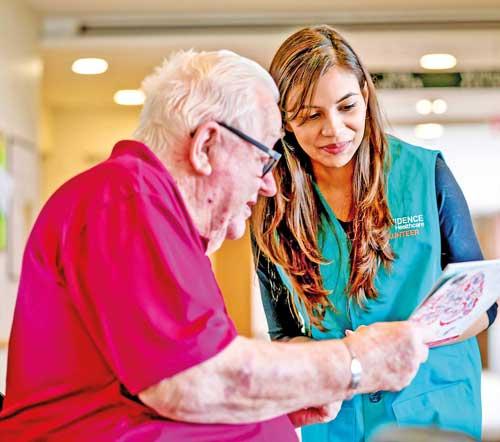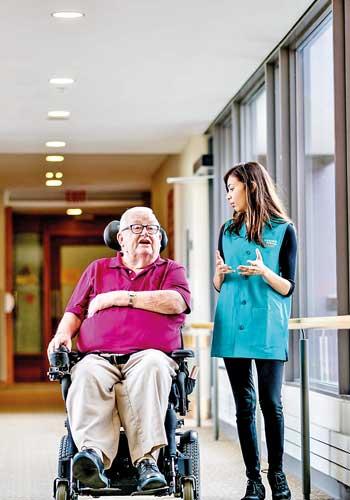31 Jan 2020 - {{hitsCtrl.values.hits}}
 People are living longer than ever before, and many seniors lead active and healthy lifestyles. Growing old is another phenomenon that all of us will experience in our life cycle. Accompanied by old age, one might face many health related problems. When taking care of an elderly person, one has to keep certain things in mind in order to provide optimum health care to the elderly. Shedding light on the society’s duty towards its elderly population, Daily Mirror Health Capsule spoke to Keshini Madara Marasinghe, PhD Candidate in Public Health and Gerontology, University of Waterloo, Canada, who educated us about health related problems faced by the elderly.
People are living longer than ever before, and many seniors lead active and healthy lifestyles. Growing old is another phenomenon that all of us will experience in our life cycle. Accompanied by old age, one might face many health related problems. When taking care of an elderly person, one has to keep certain things in mind in order to provide optimum health care to the elderly. Shedding light on the society’s duty towards its elderly population, Daily Mirror Health Capsule spoke to Keshini Madara Marasinghe, PhD Candidate in Public Health and Gerontology, University of Waterloo, Canada, who educated us about health related problems faced by the elderly.
Non-Communicable Diseases (NCDs)
According to Marasinghe most common disease conditions among the elderly are non-communicable diseases (NCDs) or chronic diseases. “These include cardiovascular diseases, cancers, diabetes, hypertension (high blood pressure), osteoarthritis, osteoporosis and chronic lung diseases. Cardiovascular disease is one of the most common causes of death among older adults. Most NCDs could be the result of genetic, environmental, physiological and behavioural risk factors such as physical inactivity, tobacco use, harmful use of alcohol and unhealthy diet.,” she said.
Joint and bone related conditions
“Most old people suffer from joint or bone pain,” she added. “While this pain could at times be categorised as ‘old age pains’, they could also be symptoms of diseases such as osteoarthritis and even some types of cancers. People are exposed to a high risk of developing osteoarthritis and osteoporosis at an old age,” explained Marasinghe.
She opinioned that such pains could be managed in a number of ways, but treatment could vary with individuals. “Therefore, a physician may suggest certain types of exercises such as Tai Chi, which is known to have many benefits in old age, therapies and medications to help manage the pain. Generally, staying active and stretching daily are simple activities older adults can do to prevent certain types of aches. It is always advisable to seek medical attention before starting any new exercise programme. It isn’t possible for an individual to know the reason behind his or her aches without having a medical check-up. As such, one has to get his or her pains and aches checked by a physician rather than assuming it is just “old age pains”. A thorough examination can help catch potentially harmful and serious conditions early and also treat them successfully or help manage them,” she said.
 Conditions related to cognitive functions
Conditions related to cognitive functions
As people age, there are many changes that occur in people’s cognitive abilities with the changes that take place in the brain. “However, these changes are not the same for every individual. Some individuals may experience drastic declines in cognitive functions while others may not.
According Marasinghe, cognitive functions that are most affected by age are attention and memory.
“Some aspects of memory such as immediate or sensory memory, episodic memory - the memory of historical events, procedural memories which are activities such as riding a bike or playing the piano have been stable with normal ageing. But studies have found that there is a consistent decline in aspects such as new learning abilities. When it comes to the retrieval of new information during ageing, studies show that the elderly may be unable to accurately recall where the memory came from. The capacity of details that could be recalled could also deteriorate with ageing. Another aspect of memory called prospective memory, which is the kind of memory that helps one remember to take medication after breakfast for example, is also affected by age,” she added.
Moreover, according to Marasinghe, the likelihood of decline in cognitive functions related to decision making, planning, multitasking, and problem solving is also higher. In addition, the risk of developing neurological conditions such as Dementia and Parkinson’s disease tends to increase with age.
Constipation, bladder and bowel control
Marasinghe emphasised that even though changes in bladder or bowel movement are common among the older population, it is not a normal part of ageing. “Accordingly, older adults should speak to their physician if anything is out of the ordinary because sometimes those abnormalities could be symptoms of a serious illness that can be easily treated,” added Marasinghe.
According to her, Urinary incontinence, which is the lack of voluntary control over bladder movement, is something that older adults often experience. “Stress incontinence, is a condition where an individual may pass urine when they are coughing, sneezing or even walking. This condition is caused by a weak bladder and weak pelvic floor muscles. It is more common among women as their pelvic floor muscles are weakened during childbirth. Men may develop this condition after surgeries such as prostate operations. Among older men, bladder problems can be a sign of underlying prostate problems. Therefore, it is always good to see a physician to make sure that there are no such undiagnosed issues,” she said.
“Urge incontinence, which is when one has to go to the bathroom so suddenly that it is difficult to get there on time, also results in the urge for frequent urination. It is often caused by an overactive bladder which is commonly seen in older age. However, if urge incontinence develops to a point that it affects your everyday life, one should seek medical attention,” emphasised Marasinghe.
Marasinghe said that the types of bowel issues include constipation and diarrhoea. “Eating food rich in fibre and fruit and vegetables and drinking a much water is always something that older adults can try when they are experiencing constipation. However, constipation can be due to other issues such as irritable bowel syndrome (IBS) that needs to be checked by a physician. Similarly, with diarrhoea, if it is a continual or frequent condition, it is best to visit a physician. This is because diarrhoea can be caused by bacterial or viral infections, IBS or other bowel diseases,” she said.
“Faecal incontinence, which is the involuntary passing of stools, is another common condition among older adults,” she added. “It can cause embarrassment, withdrawal from travelling and socializing and depression if neglected. A variety of treatments proven to be effective are pelvic floor exercises, certain medications and surgical therapies,” said Marasinghe.
Sensory Impairment
Sensory impairment is something that we often see with ageing. Marasinghe opined that severe sensory impairment could be delayed by keeping up with assessments as scheduled by physicians. She stresses that going for a check-up at least annually is a good idea to prevent and slowdown sensory impairment; especially if you have co-morbidities or diseases that increase the risk of sensory impairment such as diabetes.
“We are in an advanced age where there are many options that would help delay and manage sensory impairment in cases where it is no longer preventable. In cases where there is irreversible sensory impairment, there are assistive technologies that have been developed to assist those who are in need,” she said.
Furthermore, it is important not to be affected by any stigma associated with using assistive technologies such as hearing aids. Using assistive technologies is completely acceptable and nothing to be ashamed of.
Sexual Health
In Marasinghe’s experience, the subject of sexuality in old age remains largely taboo in many cultures, which should change, so that older adults can be open and comfortable in seeking help if and when needed.
She believes that it is alright for an an older adult to be sexually active, but they too have a few things to keep in mind. “Such individuals should talk with their partners about these changes and how they are feeling,” she advised. “Some illnesses such as arthritis, chronic pain, dementia and incontinence, disabilities, surgeries and medicines can affect the ability to have and enjoy sex in older age. However, physicians may have suggestions to help meet any challenge that may be faced due to the biological and physiological changes that come with ageing. If you are sexually active, it is important to remember that age does not protect one from sexually transmitted diseases. So safe sex practices must be followed,” she concluded.
(Ms. Marasinghe has obtained a BSc in Health and Gerontology from the University of Waterloo, Canada and a Masters in Public Health completed at the University of Saskatchewan, Canada. She has extensively worked with elderly persons and hopes to bring about awareness among the general public in treating the elderly better)
21 Dec 2024 5 hours ago
21 Dec 2024 21 Dec 2024
21 Dec 2024 21 Dec 2024
21 Dec 2024 21 Dec 2024
21 Dec 2024 21 Dec 2024